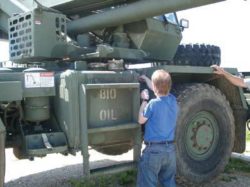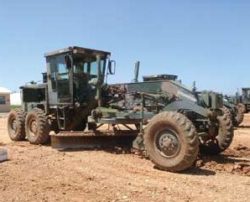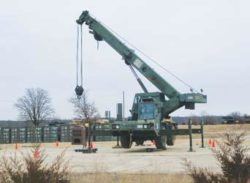
The year-long field demonstration at Fort Leonard Wood, Mo., found that all five of the biobased hydraulic fluids they tested performed well in all of the equipment.
The U.S. Army Tank-Automotive RD&E Center (TARDEC) has successfully completed a field demonstration of biobased hydraulic fluids for military construction equipment. The year-long field demonstration, conducted at Fort Leonard Wood, Mo., found that all five of the biobased hydraulic fluids they tested performed well in all of the equipment.
The field test successfully confirmed that in actual use these products met or exceeded military standards and specifications for biobased hydraulic fluids used in environmentally sensitive areas. These findings verify the performance of biobased hydraulic fluids for use in construction equipment.
“Biobased hydraulic fluid is an environmentally acceptable product and its lubrication performance is very similar to the conventional petroleum-based fluid,” said Dr. In-Sik Rhee, Senior Researcher, U.S. Army TARDEC. “This type of fluid can be used in the conventional and future hydraulic systems.”

The biobased hydraulic fluid demonstration project was part of the U.S. Army’s efforts to reduce petroleum consumption and the generation of hazardous waste and to prevent contamination of ground and surface water and soil associated with spills and leaks.
During the testing, TARDEC experienced no problems with compatibility, leaking, low temperature and more. The biobased fluids were compatible with existing petroleum-based fluids, indicating that the change to biobased fluids does not require a major hydraulic system cleaning. There were no seal material failures, leaks in any of the components or degradations in the system during the demonstration. Metal tests showed compatibility between the biobased fluids and the metals used in the structure of the hydraulic systems. Other tests showed that the biobased fluids did not generate or absorb water, did not have a volatility problem, and the viscosity of the fluids did not change significantly during the one-year test period. Further, the use of the biobased hydraulic fluids had no impact on the military mission of the unit.
Beginning in July, 2006, ten pieces of construction equipment (crane, bulldozer, scraper, grader, loader, excavator, etc) were switched from petroleum-based to biobased hydraulic fluid in order to verify the performance of military biobased hydraulic fluids qualified under MIL-PRF-32073 specification. MIL-PRF-32073, updated to MIL-PRF-32073A in April 2007, is the specification that covers hydraulic fluids made with renewable resources for use in environmentally sensitive areas. It was developed to cover hydraulic fluid requirements for military construction equipment, bridging, tactical vehicles, shipboard hydraulic systems, and metal tool hydraulic systems.

A crane at Fort Leonard Wood, Mo. was one of ten pieces of construction equipment that was switched from petroleum-based to biobased hydraulic fluid.
The demonstration project was part of the U.S. Army’s efforts to increase the use of biobased hydraulic fluids as a way to reduce petroleum consumption and the generation of hazardous waste. The Army also wanted to assess with biobased products would be effective in reducing contamination of ground and surface waters as well as soils impacted by spills and leaks. The project was also supported by the U.S. Department of Agriculture (USDA) under its Federal Biobased Products Preferred Procurement Program, which was established by Section 9002 of the 2002 Farm Bill. The biobased procurement requirements in Section 9002 direct federal agencies to give a purchasing preference to biobased products listed by USDA. USDA has listed hydraulic fluids for mobile equipment (with a minimum biobased content of 44%) as a designated biobased item. March 16, 2007 was the effective date for agencies to begin providing a purchasing preference for this item. However, there is an exception from the purchasing preference if a product fails to meet the agencies’ established performance standards. The Army’s demonstration project, therefore, was critically important in verifying the field performance of biobased hydraulic fluids qualified under MIL-PRF-32073.
The final report on this field demonstration issued by TARDEC in July 2007 recommends:
- The use of biobased hydraulic fluids meeting MI-PRF-32073 in military construction equipment;
- An extended field demonstration to determine service life for biobased fluids in construction equipment; and
- Consideration of a study to convert waste biobased fluid to biofuel.
“Agriculture provides not only the raw materials for food, feed, fiber, it can also support the U.S. industrial base with products that meet performance requirements,” said Carmela A. Bailey, National Program Leader, Agricultural Materials, U.S. Department of Agriculture Cooperative State Research, Education and Extension Service, who worked with TARDEC on the project.

